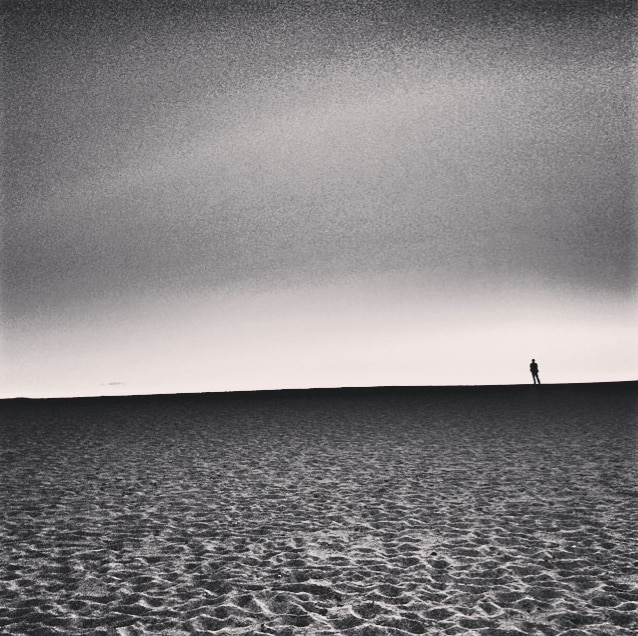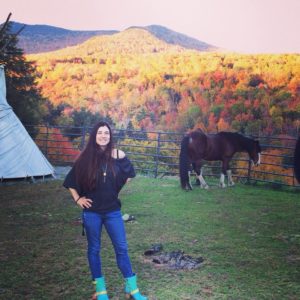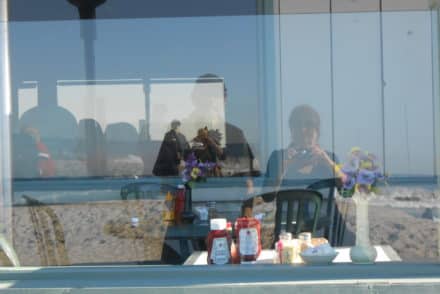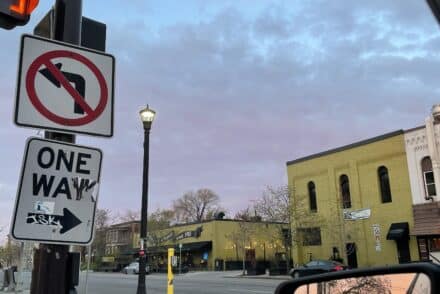By Nick Belperio
The statue was naked, and I was nine, and the first thing I thought was, Her privates are out in public. In the hush of the art museum, I snickered like someone much younger, like a seven-year old. Mom squeezed my hand, nodding at a small plaque on the pedestal.
“Can you read that, honey?” The first word was easy.
“Eve,” I said and sounded out the rest. “Dis…con…SOLE…eight?”
“Disconsolate,” she corrected, emphasis on the second syllable.
“What’s that mean?”
Mom regarded the statue for a long moment: Eve towered over us, her smooth face pitched heavenward, a serpent twining her ankle. “More than sad,” she said.
“Why’s she so sad?” I wanted to know.
“She was thrown out of paradise. Cast out forever, along with her husband. That’s why.”
I looked it up when we got home: Adj., without solace or consolation; hopelessly unhappy. Mom was right: more than sad. Nine year-old me shrugged, filing it away with the other big words I knew that no one ever used.
It came back to me thirty-some years later, during a typically sclerotic Los Angeles rush hour. As I inched homeward on Pico Boulevard, I glanced in my rearview mirror: the driver of the SUV behind me was crying. Really crying. White man in a suit, early fifties I guessed, and in the grip of a strenuous bout of weeping. A woman in the passenger seat offered him tissues and awkward half-hugs, but he looked beyond comfort. This guy was distraught. Keeping my eyes on traffic was nearly impossible.
He bawled openly, his face red and contorted, the mouth gaping; every once in a while, you’ll see an infant wail with such abandon, but a stranger? An adult? Never: It seemed extravagant, to give yourself up to sorrow so fully, a luxury somehow, and also unseemly: this level of sadness usually insists on strict privacy. He’s losing it, I thought. Why doesn’t he pull over? Doesn’t he know people can see him?
And that’s when the word first returned to me. Presented itself, fully-formed:
Disconsolate, in my mother’s soothing voice. Ah, yes. Disconsolate, adj.: illustrated—dramatized, in fact—right here in my rearview. I watched greedily, until I turned my corner and left them. I don’t remember the make of his SUV, or its color, or the color of his hair; but the anguish on that guy’s face, how pure and unmitigated it was, has never left me. That I remember. I recognize it, now that I’m in my fifties.
Aging, it seems, is an accumulation: of years and then decades, of course; of knowledge and experience, sure; of grudges and injustices and mysterious bruises, certainly. Sometimes aging brings wonder—Can you believe we’re in our fifties? my friends and I whisper incredulously. We’re officially middle-aged!—and sometimes a kernel or two of wisdom. Always, though—always—it brings loss of some sort; we know this. Losses come, and sometimes they multiply; adulthood stacks sadnesses and disappointments like firewood out back. Look at your friends. Look at mine.
Cancer took Tricia’s best friend. Lisa’s mom has dementia, her older brother a suicide. Therese, my best friend since second grade, lost her mother to Alzheimer’s not long ago. All three are strong, sophisticated women; all three have impressive accomplishments and skills. They know things, useful, adult things: how to speak exquisite French; how to keep a small business afloat; how to treat a stutterer. Knowledge and experience: my friends have a truckload of both, clearly, and they’re wise. This is middle age, we say when we hear another piece of bad news, these things are bound to happen. We know this.
We know this, and yet: “What’s happened to my family?” That’s what Therese wants to know.
It’s been about eighteen months since her mom died, and she picks at that question like a torn cuticle. The exhausting hyper-vigilance of caregiving has ended, of course, and a thankful calm has returned. But even after a year and a half, nothing has healed, not really; instead of staggering, the whole family is just limping. No one was redeemed, no one revealed as heroic, not her dad, not her brother or her sisters. In the unflattering light of aftermath, they’re only themselves, their wounded, diminished selves. Therese is shocked by the state of her family, how profoundly it’s been altered. Whatever it is that’s happened to them, it’s still happening.
My instinct is to offer comfort. I’m her closest friend, after all, and I loved her mom. Furthermore, I’ve been down this road myself: my own mother died more than a decade ago. Like Therese, I’ve cared for a dying parent; like Lisa, I’ve straddled the disorienting divide between a distant childhood and sudden, irrevocable adulthood. Like Tricia, I’ve navigated—shakily, blindly—that hideous Year of Firsts, when every occasion, for twelve blunt-force months, highlighted her absence in grotesquely inventive ways. I should be able to help.
Have I not accumulated knowledge? Do I not have experience? I have, I’m sorry to say; yes, I do. That queasy education began twelve years ago at University Hospital in Cincinnati, when my mother’s neurologist quietly closed the consultation room door and made careful eye contact with Mom, then Pop, then me. She took a deep breath.
“It’s bad news, I’m afraid.” She held a clipboard that she didn’t consult.
“Okay,” Mom said. “Okay.” I put my arm around her shoulder. Pop looked at the floor, nervously bobbing his leg.
“It’s ALS, Carol,” Dr. Moss said. “Lou Gehrig’s Disease. Amyotrophic lateral…”
No. Not this. No no no no no. “Yes,” I interrupted. “We know what it stands for. We know what it is.”
Mom locked eyes with me. “It’s a death sentence,” she whispered. My protest was a reflex: “No, Mom, not necessarily.” Yes, Mom. Yes it is.
“Well, it’s true that there’s no cure,” Dr. Moss said, and Pop put his face in his hands. Statistics ensued. “The average ALS patient…”
Yes, we know; we knew. Two months earlier, Mom finally told us about the problem she’d been having with her legs, their weird new heaviness, her grinding fatigue. My response was to arm myself with information: I plunged into a frenzy of online research, losing tens of hours to Google, WebMD, various forums and chat rooms, case histories and medical abstracts. There were a few things it could be, none of them good, and precious few of them likely. Appointments commenced: skin was pricked, blood taken, strength and relative weakness gauged, tracked, charted. I found myself hoping for multiple sclerosis, or a particularly morbid case of Bell’s palsy. ALS, though—the Mount Everest of the neuromuscular diseases, the shortest possible straw a girl can draw—please, please, please: anything but that.
In case you missed one of the thousands of Ice-Bucket Challenges that went viral in 2014, here’s the thumbnail on ALS: Amyotrophic lateral sclerosis is a neuromuscular disease for which there is no cure and scant treatment. Communication breaks down between the brain and the nerves that control voluntary muscle movement—basically everything except heartbeat and digestion—and the muscles stop responding to the brain. Paralysis follows, insidiously. The majority of ALS patients live about three years after diagnosis, maybe four. One-fifth of the unlucky bastards live more than five years, and in rare cases, they live a decade or more. The physicist Stephen Hawking has lived with ALS for more than twenty; with the exception of an eyelid, he’s entirely paralyzed and—here’s the hideous cruelty—completely alert and aware. Locked up, they call it.
It’s the opposite of Alzheimer’s, which takes the mind but leaves the body intact, and Mom had seen it up close: forty years earlier, she’d lost her favorite uncle to ALS. She helped with his at-home care and she watched him deteriorate. Better than any of us, she knew the cataclysm of ALS.
Dr. Moss eventually answered the question none of us asked. “…three years after diagnosis, maybe four, on average.” Yes, we know; we knew.
My family was fortunate. ALS galloped through my mother. Five months after that conversation in the neurologist’s office, a few months before her sixty-third birthday, she was dead.
It wasn’t a surprise, of course; the ALS narrative rarely gets an alternative ending. What was a surprise, though, and a sickening one, was the relief I felt when it was over. The gratitude I felt for this one awful lesson: death is not always unwelcome. It is not always the worst thing.
Nor is it a single event. A significant death earns encores, revealing itself in surprise detonations, tripwires and trapdoors everywhere, sadness slipping in over the transom. That’s where Therese is now. I see her pain, but I cannot help it.
Because twelve years in—twelve fucking years—my mom’s death is still happening to me. Twelve years after the fact, I still haven’t worked out how to reconcile the relief I felt with the grief I feel. I’m not wiser; I’m just older and more hurt. The only real knowledge I’ve gained is that there’s a name for my condition. Say it with me:
Disconsolate.
* * *
About a week after Mom’s funeral, a kind friend invited me to stay with her for a few days at her house in a suburb of Columbus, Ohio. I badly needed the respite and the change of scenery; I borrowed Pop’s Toyota and headed two hours north. After a wine-soaked weekend I felt somewhat restored, if a bit hung over. On Sunday morning I kissed my friend goodbye gratefully and was Cincinnati-bound before dawn.
Ohio’s flatness is harsh in late fall, fields stripped brown and bruised. I’m outside of the city by the time an indifferent November sun bleeds through. One or two other cars pass, maybe a trailer jammed with sheep; but mostly I’m alone here on I-71. Ohio is reluctant to lift its head today.
Two hits off my bowl and I press play: Johnny Cash’s new CD, which is getting raves. A few days earlier, I’d seen the video for “Hurt,” his cover of the Nine Inch Nails hit, and I loved how beautifully it translated.
Mom surely had a fondness for a sad song, and this album sounds like it could be a downer mixtape made just for her. In spare, simple arrangements, it’s Johnny doing some of her favorites: “Bridge Over Troubled Water.” “Desperado.” “I’m So Lonesome I Could Cry.” “Danny Boy.” And holy shit, “The First Time Ever I Saw Your Face.” When I was a kid, Mom had the 45, the original by Roberta Flack. She’d play that song, all of these songs, repeatedly while she sat cross-legged on the floor, harmonizing in front of the stereo. I’d sprawl next to her on the shag carpet, examining album covers while she sang along. Countless hours with her, listening; they’re some of my happiest memories.
That morning in the car, I turned up the volume. Johnny’s exhausted baritone sounded like Ohio looked: wrung-out and so lonesome. Something dire in his voice, its hoarse beauty, caught me in the chest.
He’s dying, I realized, and he knows it. There’s death in that voice, and in these songs from my childhood; death in these used-up fields and in the vast, oyster-colored sky. Death is all over me, I thought. It’s all over my family.
Those last months had been an avalanche of helplessness and its toll had been taken from each of us. My father, physically outmatched by the demands of caretaking, drained and stumbling. My sister, bent in half from grief, attempting to explain Grandma’s walker to her girls. Those same girls, my darling nieces, wide-eyed from the misery around them. Mom’s mom, our grandmother, shattered; my uncle, transfigured into something raging and unrecognizable. None of which, of course, came anywhere close to what Mom went through herself: the horror of her body collapsing, turning against itself. The humiliation of becoming a problem to solve. Of being insoluble.
This time I got it; oh, did I get it. We are disconsolate. Not just “without solace;” without even the possibility of solace. Not simply “unhappy,” but “hopelessly unhappy.” More than sad. That’s what I heard in Johnny Cash’s stripped-down lamentations that morning: all of these drastic changes to my family, now permanent, non-negotiable.
We will never recover, I understood finally. The weight of that fact, the finality of it, unstoppered me.
Ragged sobs roared out of me. I gripped the steering wheel with one hand, tightened the other into a fist and pounded my chest, my thigh, the passenger seat. She was always Mom or Ma or Carol, but that morning I called for Mommy.
Never had I cried this hard, so fully, such gales of weeping. When I watched that guy behind me on Pico, I didn’t know how much it hurts, to cry like that: unmitigated anguish fucking hurts. Physically, like when your body strains to vomit while also trying not to. I stopped fighting, and I let it come. I let it take over and kill me. Just fucking kill me. For a few minutes, it did.
A sedan passed on my left, a family of four, probably on their way to church. All four of them looked right at me. What they saw makes me cringe even now: a bald and furious man hunched at the wheel, face tearful and contorted, mouth wide in howling, it appears, at his windshield wipers. Unlike me on Pico, they at least had the decency to look away.
It felt like hours had passed—catharsis is exhausting—but finally my composure and breath returned. I ejected the dejected Mr. Cash and listened to the car’s tires humming interstate tunes the rest of the way back to Pop’s. I threw away that CD. I avoid those songs now.
They were probably on their way to church, that family, and they must have wondered, Why doesn’t he pull over? Doesn’t he know people can see him? Maybe they prayed for me.
When I returned to Los Angeles later that November, the brightness was disorienting, a sudden summer. LAX was a love-in: people hugged, shook hands, kissed shamelessly. Open affection, broad smiling faces were everywhere I looked. I walked past them, blinking, stealing surreptitious glances. Don’t they know? I wondered. How is all of this life continuing? How can everyone be so casual?
Everything went obscenely on; grief hadn’t stopped this world. Here is Sbarro’s and Starbucks, like always, and the chaos of Terminal One; here is baggage claim, precisely where it always is. Outside, in the taxi line, the usual smell of exhaust, both diesel and tobacco. Everything looked the same, but nothing was. Nothing felt familiar.
At least my taxi driver was nice. I noticed him studying me in the rear-view mirror.
“Are you Armenian?” he asked finally.
“No.”
“You should be,” he said. I laughed out loud and felt something fall away from me, a brief warm stirring. California, I thought. Sunny and so strange, after those months in Ohio.
At home, my refrigerator was empty, the cabinets paltry. I wanted a shower and sleep, but I also wanted milk for my coffee in the morning, fresh fruit, good bread.
The cashier at Trader Joe’s said hello, then looked at me again, a flicker of concern in her eyes. “Sir? Everything okay?”
I looked at her for a long moment, debating: what’s the protocol here? What should I tell her? The truth? She’s just being nice; say you’re fine. “I don’t mean to intrude,” she said, removing items from my basket. “I’m sorry.”
Another long moment. “To tell you the truth, yeah, I’m a little jacked up,” I said. “I just got back from Ohio a couple hours ago. I helped my mom die.”
She reached for my hand, pressed it with both of hers. “Such sadness,” she said. “My God, I could see it. What’s your name?”
I told her. “Nick, I’ll pray to my higher power that you feel some peace soon.”
Out of nowhere, this moment of grace: attention from a stranger whose eyelashes and Afro and earrings I still remember. A few quick seconds of kindness, of recognition. I see your pain. I’m sorry for it.
Huh. Again, the feeling of something falling away. Lightly, in a good way. Maybe not everything is November in Ohio.
The really sick thing about grief is its banality. That you get used to it. I’d thought—and maybe even hoped—that I’d be capsized, incapacitated in my misery. I was wrong; it wasn’t operatic, no Sicilian widows wailing on their knees, nothing draped in black. It’s mundane and manageable; you can around with it, you can get shit done. I bathed, I paid my bills, I went to work. I moved on, as they say: grief as little more than a single stop on a crowded itinerary.
Consequently, this story doesn’t resolve tidily, like a sitcom. I’ve got no advice, no platitudes for the grieving. Grief is too specific, and there’s no cure for it, anyway. Your condition is terminal. This story doesn’t have a neat ending because grief only decrescendos; it doesn’t end.
I think of it like this: you’ve slept in a bed your entire life, comfortable and blissfully taking for granted that comfort. Then whammo: your bed gets taken away; all beds, for the rest of your life, are unavailable to you. Now you sleep on an uncarpeted floor, and that first night, holy Christ, is it agony. I will not make it through this night, you think. It is not possible to endure this.
After a week, though, you are starting to get some sleep; you’re still stiff in the morning, and cranky, but at least you got a few hours. A month later, you’re sleeping well. You’ve stopped grumbling about the unforgiving floor and you look forward to your night’s sleep. Impossibly, before too long, you’re sleeping deeply, dreaming sweetly and waking refreshed. But:
You‘ll never forget that once you slept in a bed.
That’s mourning. That splinter of sadness, mostly unnoticeable but sometimes throbbing. More than sad and more common the older we get.
Look at your friends. Look at mine. I see your pain. I’m sorry for it.
Nick Belperio is an Emmy-winning writer and former network television executive who now teaches in the Electronic Media Department at the University of Cincinnati. He lives in southern California and southern Ohio.

The 12 Day Detox is here. Sign up now for the next cleanse on August 10th. Space is limited. This detox comes at just the perfect time. Reprogram your body and mind as we move into the new season of spring. This is your time of rejuvenation and renewal.This is not a juice fast, or a detox based on deprivation.

Jen Pastiloff is the founder of The Manifest-Station. Join her in Tuscany for her annual Manifestation Retreat. Click the Tuscan hills above. No yoga experience required. Only requirement: Just be a human being. Yoga + Writing + Connection. We go deep. Bring an open heart and a sense of humor- that’s it! Fall 2015. It is LIFE CHANGING! Sep 26-Oct 3rd






10 Comments
Nick, this essay undid me. Except I’m already undone. Yes, because I’m sixty-one and I completely get it. Thank you for the words. Stunning piece!
Kelly, you DO get it: already undone, undone for good. How awful that you get it. Thank you for your kind words, and for taking the time to comment.
Oh my goodness, my friend. Simply amazing…and I needed this right now. Thank you.
Thank you for letting me know, sweet Kerry; I regret that you needed it all, but if it landed for you, then I’m thrilled. Thank you for reading and for reaching out. Sure do miss you.
My but this is good.
Thank you
Thank you, Sheila, how kind of you to comment. I really appreciate it.
You hit the nail on the head…that’s exactly what it’s like. Such a powerful and honest article.
Sheila, how nice; thank you for taking the time to read and to comment.
For the rest of my life I will not forget the bed then the floor explanation for grief. Thank you so very much
I keep coming back to read this over and over again. Sadly, I get it. It’s so hard to describe yet you’ve done a beautiful job. Thank you for this. We will never recover. The truth of this shatters me daily. My family limps on…